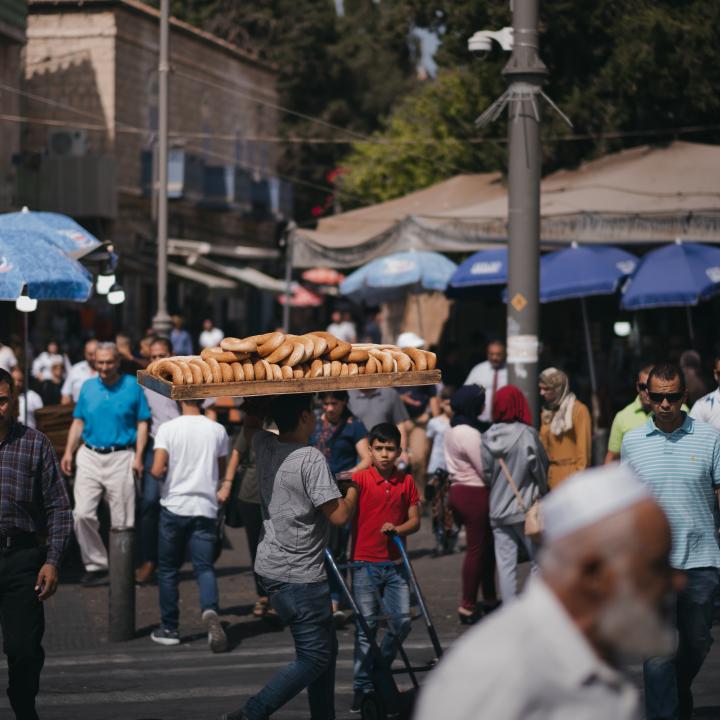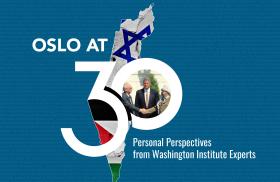
- Policy Analysis
- Fikra Forum
New Polling and the Legacy of the Oslo Accords

Part of a series: Oslo at 30
or see Part 1: Oslo at 30: Personal Perspectives from Washington Institute Scholars A Compendium
When examining the legacy of the Oslo Accords, one clear outcome is the way in which diplomatic breakthroughs—along with their failures—have deeply shaped public attitudes towards the conflict. Thirty years later, fresh polls emphasize the deep erosion of trust and support for the two-state solution in Palestinian (along with Israeli) society, but a lingering hunger for some kind of breakthrough.
In the 1990s, efforts to move forward the peace process on tenets laid down via the Oslo Accords opened up a window of hope in Israeli and Palestinian society, visible in public opinion polling from this time. Polling results from Palestinian pollster Khalil Shikaki and his team in the aftermath of the Oslo Accords demonstrated their impact; support for the “peace camp” rose during the years that the Oslo process appeared to be viable, even as setbacks emerged—reaching a height of 72% support for Oslo II in 1995.
But the legacy of Oslo has since soured; when polled in 2018 by the Jerusalem Media and Communication Center, the large majority reported that the Oslo Accords were either harmful to Palestinian national interests (47%) or made no difference (34%). And attitudes among both Israeli and Palestinian publics have likewise turned against the foundational assertion of the peace process—a two state solution.
Over the intervening years, public opinion polling has demonstrated that support for a two state solution—the principal end point of the peace process—dipped into the minority among both Jewish Israeli and Palestinian publics after 2017 and has shown few signs of recovery. Ironically, trends in Israeli Jewish and Palestinian attitudes on this question from 2016-2022 are almost statistically identical. In the latest Palestine/Israel Pulse from Shikaki, conducted in December of last year, just 33% of Palestinians (28% of West Bank and 41% of Gazan Palestinians) and 34% of Israeli Jews expressed support for a two-state solution. Israeli Arabs, at 60% support, stand out as an outlier population.
And when it comes to trust, 88% of West Bank and 81% of Gazans disagree that it is possible to trust Israeli Jews, with 85% of Israeli Jews saying the same about Palestinians. Arab Israelis are again the outlier, with half agreeing that it is possible to do so. This overarching lack of trust is easily visible on both sides in a slew of polling responses about the intentions of the other side or their likelihood to honor any future commitments.
More recent TWI polling of Palestinians conducted in July highlights some of the challenges underscoring this shift in Gaza and the West Bank, and specifically the violence that characterizes the incomplete disengagement from the West Bank and helps shape Palestinian attitudes there. First is the widespread expectation of Israel’s imminent military involvement. In Gaza, 65% believe it is at least “fairly likely” that there will be a large military conflict between Israel and Hamas in Gaza this year. A similar percentage of West Bank Palestinians (61%) say the same about a larger Israeli military operation in the West Bank—a view likely impacted by the Israeli military incursion into Jenin immediately preceding the poll fielding period.
For many West Bank Palestinians, putting a halt to military or security incursions in area A cities (26%) or settler violence (29%) would be key signals of an Israeli desire for a two-state solution. Support for these two options is significant as compared to the preference for Israel sharing Jerusalem as capital (10%), allowing more freedom of movement, (16%) or freeing more Palestinian prisoners (17%).
But support for Palestinian attacks against Israelis is also high—a significant departure from the immediate post-Oslo years. In August-September 1995, Shikaki measured Palestinian support for attacks on Israeli civilian targets at just 15 percent. In contrast, according to current TWI polling a majority of Gazans and West Bank Palestinians (59% in both locales)—but not East Jerusalemites—say it is good for Palestinians to attack Israelis, with little change in percentages of those who say Palestinian attacks against the IDF, settlers, or “all Israeli Jews” are good. Meanwhile, the percentage of those who reject this view has steadily decreased in the West Bank in particular—with those who say such attacks are ‘good’ increasing by seventeen percentage points since 2019.
The factors driving popular support for armed struggle are many. In the West Bank especially, this disconnect reflects the failures of Oslo to guide the two sides towards an understanding or even basic knowledge of the other. Such attitudes are clearly demonstrated in rhetoric from leadership of governments theoretically committed to a two state solution. A small sampling includes recent and earlier comments by Mahmoud Abbas repeating well-worn anti-Semitic tropes denying Jewish connection to the land and the intrinsic anti-Semitism of the Holocaust and comments from Treasury Minister Betzalel Smotrich labeling Palestinians “an invention” and calling to ‘wipe out’ the West Bank town of Huwara after a terrorist attack. Armed groups such as the Lions Den are also drawing support.
But another underlying issue that may be contributing to this attitude is a profound lack of information among a significant proportion of Palestinians as to some of the basic realities of neighboring Israel, as demonstrated in Palestinians’ responses to questions on population estimates. When asked to give their best estimation of the population size of Israeli Jews, most East Jerusalemites had a sense of the correct number (latest census estimates from 2021 are approximately 7.4 million). In contrast, 45% of West Bank and approximately half of Gazan Palestinians believed that there were fewer than a million Jews in Israel today.
For many West Bank Palestinians—especially those living in the north rather than the relatively connected locales near Jerusalem—their only exposure to Israeli Jews is through settlements and military incursions. The accompanying violence is a pervasive part of West Bank society; 56% of West Bank Palestinians report in PCPSR polling to have personally witnessed a killed or injured Palestinian as the result of an Israeli attack. Lacking basic knowledge of Israeli society is also correlated with support for attacks on its civilians; in TWI polling conducted in the West Bank, there is a twenty two percentage point increase in those who say that attacking ‘all Israeli Jews’ is a bad thing among those West Bank residents who have a more realistic perception of Israeli Jewish demographics.
In fact, the sub-sample of East Jerusalem Palestinians in TWI polling provides an instructive window into the difference that actual contact outside of conflict can have on popular opinion. This Palestinian community—living with a much deeper connection to Israeli society while still navigating significant challenges within it—has in many ways a much different approach to the conflict and relations with Israel than those in the West Bank and Gaza.
In contrast to a plurality of other Palestinians who support a Palestinian national priority to “escalate the resistance against Israel, even if that makes life harder right now” (41% in WB and 47% in Gaza), the plurality of East Jerusalem Palestinians—46%—believe the focus should instead be on negotiations. And when asked whether they agree that “I hope someday we can be friends with Israelis, since we are all human beings after all,” about two thirds of East Jerusalemites (63%) say that they do, as compared to 42% of Gazans and just 29% of the West Bank. When it comes to accepting the core belief underlying a two state solution—“two states for two peoples”—if it might help end the occupation, a similar 64% of East Jerusalemites would do so.
And there is an openness to increased contact with Israelis among many Palestinians alongside the popular support for armed conflict. When presented with the suggestion that “Palestinians should encourage direct personal contacts and dialogue with Israelis, in order to help the Israeli advocates for peace support a just solution,” 55% of West Bank Palestinians, 64% of Gazans, and 74% of East Jerusalem Palestinians agree. And while the majority of Palestinians (and Israelis) may now reject a two state solution, significant numbers of Palestinians (47% in Gaza and 42% in the West Bank) agree like most East Jerusalemites that Palestinians should “accept the principle of two states—for the Palestinian people and the Jewish people” to help end the occupation.
In public opinion polling, the hope visible in the immediate-post Oslo period is now clustered within Palestinian/Israeli-Arab communities living in the context of a broader Israeli society, with few signs of life among either Israeli Jews or other Palestinians. Nor is there the expectation on either side that the kind of political will that led to the Oslo Accords exists at present. Nevertheless, attitudes in East Jerusalem help emphasize that engagement outside of a militarized context does make a difference in support for non-violence.








